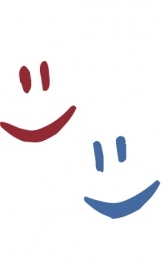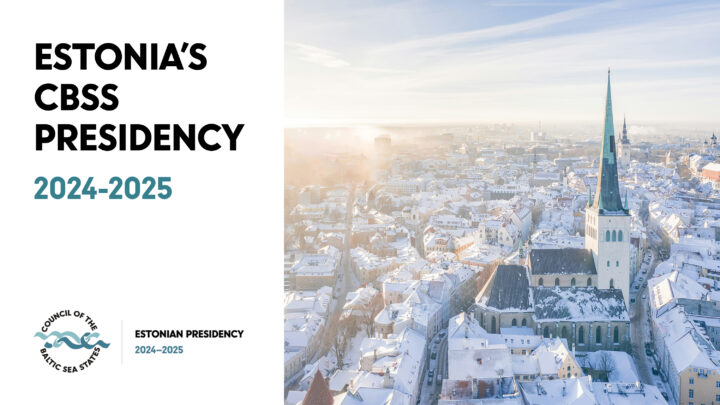Icelandic presidency – placing the child in the centre
Upholding children’s rights is the obligation of all CBSS Member States and it was a key topic for the CBSS during its Icelandic Presidency 2016-2017.

The logo of the Icelandic Presidency of the Council of the Baltic Sea States represented smiling children who are facing a world of openness, freedom and safety – achieved only through a democratic society where everyone has a voice. The different colors represented gender equality, diversity for all and at the same time represent the Icelandic flag.
The Icelandic presidency’s priority represented a major leap forward for the CBSS Expert Group on Children at Risk.
Sustainable development goals
The Icelandic Presidency of the CBSS coincided with the coming into force of the UN Sustainable Development Goals 2030. The Sustainable Development Goals includes, for the first time, a specific target (16.2) to end abuse, exploitation, trafficking and all forms of violence and torture against children.
Mandate and strategy 2017-2020
The Mandate and Regional Strategy for Cooperation on Children at Risk, July 2017-2020 built on the achievements from the previous strategy period. The priority areas are closely related and the achievements in one priority area have relevance and impact in the other priority areas.
The Expert Group agreed to support member states in bolstering their child protection and welfare systems, notably in the following priorities:
- Prevention, early intervention, parenting and family support
- Child-friendly justice
- The wellbeing and best interests of children in alternative care
- Protecting children from sexual abuse and sexual exploitation
- Preventing trafficking and exploitation of children
- The best interests of children in migration
The mandate was complemented by the regional strategy and a Terms of Reference for the members, which had been adopted during the Polish presidency 2015-2016. The Terms of Reference received minor updates at this time.
Website and acronym updates
The abbreviation of the Expert Group was updated from EGCC to CAR as of May 2017, to reflect the shortened name of the group and at the same time as it adopted the new Mandate.
The website changed URL from childcentre.info to childrenatrisk.eu.
PROMISE promoting Barnahus
The first phase of PROMISE was well under way during this time. A highlight during the Icelandic presidency was an exchange meeting organised in Linköping, Sweden with the attendance of HM Queen Silvia.
In addition, the European Barnahus Movement was launched in Brussels with the presence of The EU Commissioner, the UN Special Representative on Violence against Children, the Council of Europe and other dignitaries.
One of the reports developed during the project, Enabling child-sensitive justice: The success story of the Barnahus model and its expansion in Europe was a follow-up to the 2015 conference on handling child evidence, which was co-organised with the Council of Europe.
PROTECT Children on the move
The CBSS Expert Group on Children at Risk and the Nordic Council of Ministers organised meetings in Helsinki and Stockholm with professionals from the Baltic Sea Region. An Addendum was developed to the Guidelines on the human rights and the best interests of the child in transnational child protection cases. Planning was ongoing for additional trainings during 2017-2018 aiming to learn more about the identification and referral systems. Children’s participation is part on the new cooperation on preventing exploitation and trafficking of children.
The unaccompanied children conference and the Stockholm conclusions
The Stockholm Conclusions developed by 60 representatives from 24 European countries in a cooperation between the CBSS Expert Group on Children at Risk and the Central European Initiative, highlight important recommendations and good practices regarding migrant and asylum seeking children, especially those who are unaccompanied.
Poland and Sweden – two pioneers in children rights
As a side event of the Unaccompanied Children conference, the Embassy of the Republic of Poland in Sweden and the CBSS Expert Group on Children at Risk organized a seminar: “Poland and Sweden – two pioneers in children rights – challenges for the Baltic Sea Region”. This event commemorated the 27th anniversary of the Convention on the Rights of the Child. Polish lawyer Adam Łopatka was the keynote speaker, who was leading the process of developing the UN Convention on the Rights of the Child, a Convention ratified by nearly all countries in the world.
Non-violent childhoods
The Non-violent childhood: moving on from corporal punishment in the Baltic Sea Region project was launched in February 2017. National consultations were organised in May in Sweden and in June in Finland. The aim of the project is through national consultations and expert meetings to develop guidance and tools to support national efforts to reduce violence against children. This project received particular attention from the Lithuanian CSO member as the country in February 2017 adopted legislation banning corporal punishment in all settings.
AudTrain – system based audit of child welfare facilities
This project came to a close after training 40 auditors and 20 new trainers. A final conference was organised in June in Vilnius to promote a child rights approach to auditing of welfare facilities.
Expert group meetings
The CBSS Expert Group on Children at Risk had two meetings during the year: The meetings were held on the 25-26 October 2016 and on the 15-16 May 2017. Both meetings were in Reykjavik. The Expert Group meeting in October was extended to include a joint meeting between CBSS Expert Group on Children at Risk and the CBSS Task Force against Trafficking in Human Beings presenting and discussing different aspects of trafficking.
CBSS Task Force against Trafficking in Human Beings
The joint meeting in October 2016 between the two Expert Groups included presentations of past and current projects and a study visit to the Children’s house. The groups underlined their important roles in preventing, identifying and protecting persons at risk and building capacity of key actors in the Baltic Sea Region. They agreed to continue sharing expertise and working together in the Secretariat on various issues of common interest. The two groups have complementary but distinct areas of expertise and are currently cooperating on several projects.
